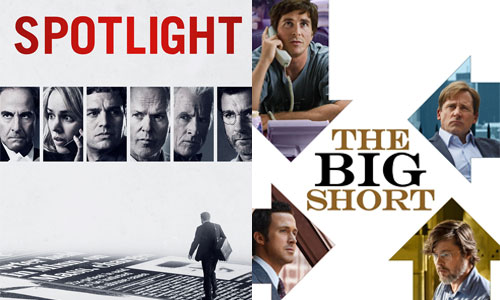June 8, 2016
Editor’s Note: The 2015 award-winning films “Spotlight” and “The Big Short” are now available on DVD and on-demand.
It’s a no-brainer to review these two films together. Each in its own way is a variation on the classic Hans Christian Anderson tale “The Emperor’s New Clothes.” Both waltz around an elephant in the room: something rotten is taking place and decisions have to be made. Both films expose those who pretend it is “business-as-usual,” revealing the horror of the sound of silence. Both reveal what happens when moral codes are abandoned to the detriment of millions directly and indirectly: disillusionment wreaks havoc with the heartland.
In the case of “Spotlight,” Boston Globe reporters (uniformly portrayed with excellence by a fine roster of actors, especially Mark Ruffalo and Rachel McAdams) play the child crying out: “the emperor is wearing no clothes!” Here, we see the drama of investigative reporting as it prepares to expose the horrendous deceit of the Catholic Church hierarchy protecting pedophile / ephebe-ophile priests. They do so with a strong moral righteousness on behalf of the children and teenagers who were abused and those who could or would be. The irony in a very brief scene as Mark Ruffalo’s reporter sees children singing “Silent Night” in a church’s Christmas pageant is heartbreaking. Moreover, “Spotlight” reflects the important role journalists play in free societies exposing abuses of power in institutions from Church to State. In that, I think it is superior to the other fine journalist-centered film “All The President’s Men” (the 1976 film directed by Alan J. Pakula).
Director Tom McCarthy keeps the pacing at an exciting pulse and he and his co-screenwriter Josh Singer keep the dialogue clear and illuminating. Furthermore, the tone and style of the movie is not one of grand standing but of insight, sobriety and even humility as it exposes the failures of people in power. Not only is the Church guilty (beyond the hierarchy so were so many parents and clueless parishioners) but Boston’s civic leaders, lawyers and even the reporters’ own paper, the Boston Globe. There are many meanings to Jesus’ statement “The truth will set you free” (John 8:32) and here is an excellent example of the power of truth when it is, at last, set free, however horribly delayed. I suggest bishops involved in the cover-up see this movie annually as part of their Lenten Penance. But not only our bishops, but all clergy and leaders in every field of church, state, education, medicine – wherever fears of liabilities and the temptation to protect reputations could prevail at the expense of victims and the public good.
Admitting wrongs may be considered shame in social circles but in truth, and in true religion, it is deliverance toward the greater good insuring the cessation of evil and preventing future harm. “Spotlight” makes it very clear how admitting one or two scandals early on (and implementing clear preventative guidelines now in place but only after the Boston Globe’s exposé) would have spared hundreds of victims and put the bishops on the humble path all people of faith should walk.
“The Big Short” takes a different point of view exposing (and explaining) the debacle of Wall Street and U.S. banks. The protagonists here also see the truth of what is going on but unlike the whistle-blowers of “Spotlight,” they prefer to keep the story to themselves in order to benefit by it. What seems like a gamble to most is a matter of certainty to them: the financial real estate bubble is ready to pop. Our heroes (irony intended) position themselves to become millionaires / billionaires by investing in what is a kind of insurance policy: when the mortgages and real estate investments fail, they’ll collect big time! And there isn’t one character concerned for “the greater good.” Should any one expose the oncoming avalanche none of our brilliant geek insiders would benefit. A shred of moral thinking enters into the investors mindset: some believe they are teaching Wall Street a lesson by using its greed against them, but this amounts to nothing more than a self-serving rationalization. Many will suffer; a few will strike it rich.
“The Big Short” makes for good drama revealing subterfuge at its most manic but because it explores the complexities of the financial world, it also is a contemplative film. Director Adam McKay and his co-screenwriter Charles Randolph inspired fine-tuned performances from another great ensemble cast (Steve Carell and Ryan Gosling were stand-outs for me) and offer seasoned insights into human nature, particularly the fallibilities of materialism and greed. Ironies abound in this film, too. For one thing, all the focus and concentration required to attend to the script only makes it clear how so much of Wall Street’s shenanigans went undisclosed. With sadness and cynicism, the film conveys how industry insiders bypassed moral deliverance and opted for greed. The rest of us were unaware and/or didn’t care. And how was it that the government and the media turned a blind eye? Answers to that question may inspire some scrutiny regarding presidential and congressional candidates this November.
Paulist Fr. James DiLuzio leads parish missions around the United States. He is the creator of “Luke Live.”
